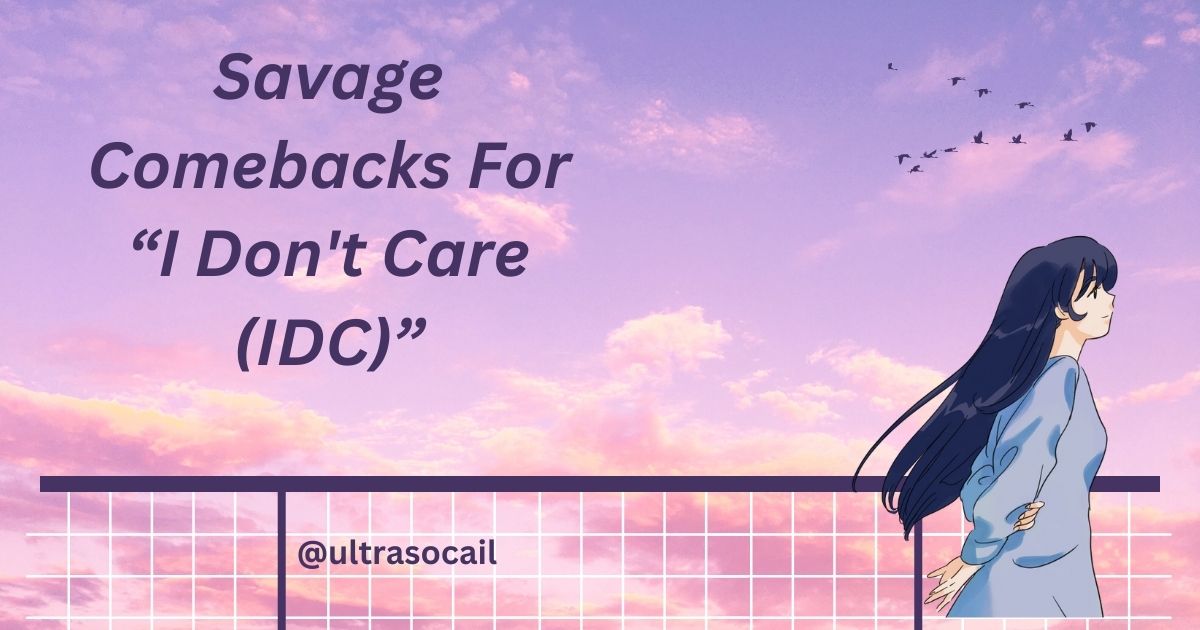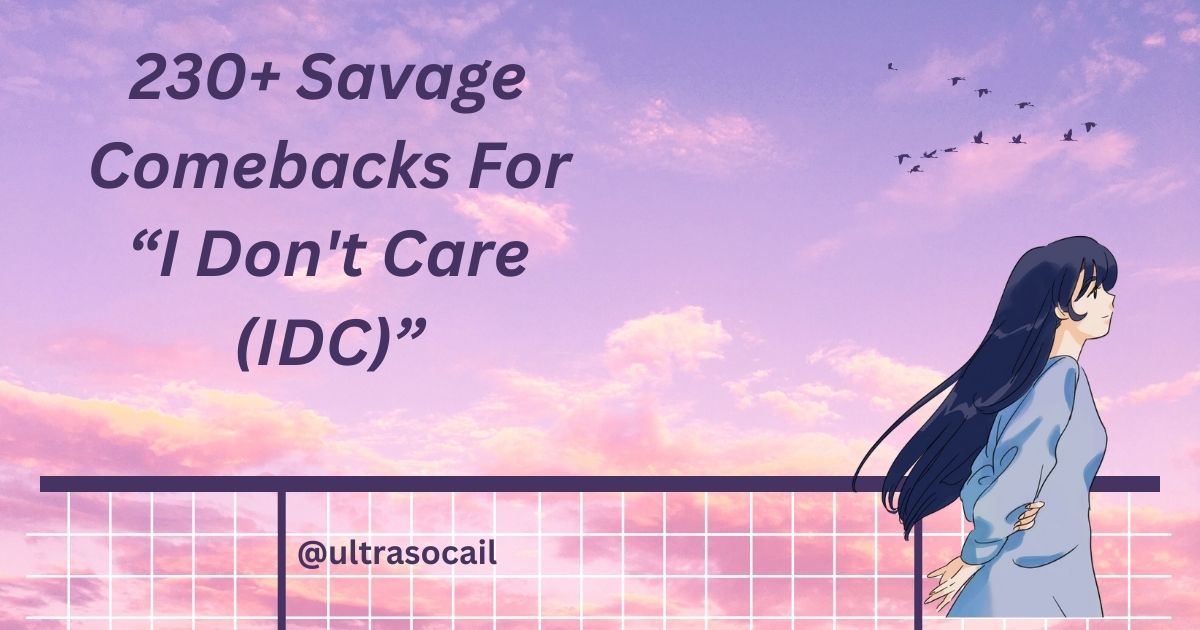In the realm of conversation, the right words can change everything. When someone tosses out “I Don’t Care (IDC),” it often stings and leaves you wanting to fire back. It’s a phrase that screams indifference, but you don’t have to let it slide. Instead, you can respond with style, confidence, and a touch of humor.
This article is your ultimate guide to reclaiming the moment with 230 savage comebacks. Each response is crafted to showcase your wit and assertiveness, turning dismissive remarks into engaging exchanges. Whether you prefer clever quips or philosophical insights, you’ll find the perfect comeback to make a statement.
Empower yourself to navigate social interactions like a pro! Armed with these comebacks, you can face any “I Don’t Care (IDC)” remark head-on. Let’s dive in and transform those moments of indifference into opportunities for confident expression.
Understanding “I Don’t Care”
Understanding the phrase “I Don’t Care (IDC)” goes beyond its literal meaning. It often reflects a person’s choice to disengage from drama. When someone says “I Don’t Care(IDC),” they might be expressing frustration or simply choosing not to invest energy in negativity. This phrase can also serve as a shield. It helps protect one’s peace and mental well-being.
Often, “I Don’t Care (IDC)” signifies empowerment. It shows that a person has set boundaries. By using this phrase, individuals assert their independence. They refuse to let others dictate their feelings. Recognizing when to say “I Don’t Care(IDC)” is crucial. It allows for emotional clarity and healthier interactions. Understanding this phrase can lead to better communication and stronger relationships.
Why Good Comebacks Matter?
Good comebacks are essential in social interactions. They help you navigate difficult conversations and maintain your confidence. When someone dismisses you with “I Don’t Care (IDC),” a clever response can shift the dynamics. A well-timed comeback shows that you won’t be easily brushed aside. It’s a way to reclaim your voice and assert your presence.
Moreover, good comebacks can defuse tension. They allow you to address issues without escalating conflict. A witty response can make the other person reconsider their attitude. In a world filled with dismissive responses, effective communication is vital. By crafting solid comebacks, you promote understanding and respect. Ultimately, learning to respond to “I Don’t Care (IDC)” with finesse enhances your social skills and boosts your confidence.
230+ Savage Comebacks For “I Don’t Care (IDC)”

This section presents the heart of the article: a diverse array of savage comebacks for when someone says “I don’t care(IDC).” Each quote is crafted to engage, provoke thought, or simply amuse. Here are ten quotes for each of the following themes:
Dismissive Responses
- “Your indifference is noted; thanks for the update!”
- “Good to know your heart is as cold as your words.”
- “IDC, but that doesn’t mean I’ll stop caring.”
- “Your lack of interest is so inspiring; I almost cared!”
- “Congratulations! You’ve achieved new levels of indifference.”
- “I see we’re both fluent in sarcasm; let’s keep chatting.”
- “Thanks for your unsolicited indifference; it’s remarkably dull.”
- “Your ‘I don’t care’ is as impressive as your personality.”
- “Don’t worry, your apathy doesn’t bother me at all.”
- “Keep your indifference; I’ll take genuine interactions, thanks!”
Sarcasm
- “Oh wow, your indifference is breathtaking. Truly.”
- “I didn’t realize I was talking to a wall.”
- “Your lack of care must be exhausting to maintain.”
- “Your indifference is so strong, I can practically feel it.”
- “Thanks for your enlightening perspective; I’ll file it under ‘Who Cares?’”
- “Your indifference deserves an award for best performance.”
- “Apathy looks great on you; it really suits your vibe.”
- “Wow, a masterclass in indifference! Teach me your ways.”
- “Thanks for showing me the true meaning of ‘who gives a damn.’”
- “Keep that indifference up; it’s almost impressive!”
Witty Responses
- “IDC? Sounds like a personal problem, not mine!”
- “Indifference is your superpower; too bad it’s not mine.”
- “If I had a dime for every time you didn’t care”
- “Apathy may be your game, but I play for keeps!”
- “Your indifference is so profound; let’s write a book about it.”
- “Oh, how original! Another ‘I don’t care’ line.”
- “Sounds like someone woke up on the wrong side of indifference!”
- “Thanks for your input; I’ll add it to my collection of ‘meh.’”
- “Your ‘who cares’ attitude is truly inspirational; not!”
- “Don’t worry, your indifference will be noted in the record books.”
Assertiveness
- “Your indifference doesn’t define my worth; I’m still fabulous.”
- “I’ll keep caring, even if you choose to stay indifferent.”
- “Apathy doesn’t suit you; try passion for a change!”
- “Your indifference is just a reflection of your comfort zone.”
- “Stay indifferent; I’ll be over here shining bright!”
- “I embrace caring; it’s the indifference that scares me.”
- “Your words don’t bother me; they’re just noise.”
- “IDC about your opinion; I’ll keep thriving regardless.”
- “Indifference is easy; choosing to care takes courage.”
- “Your dismissal won’t change my vibrant spirit.”
Humor in Conversations
- “I don’t care? Well, that’s the point of this conversation!”
- “Indifference: the silent cry of an unamused heart.”
- “Who knew ‘I don’t care’ was the new ‘hello’?”
- “Apathy may be the new trend, but I prefer humor!”
- “Your indifference is like a bad joke; nobody laughs.”
- “Indifference is so last season; I’m all about engagement!”
- “Thanks for your nonchalant input; it really brightened my day!”
- “Apathy won’t save you from my fabulousness!”
- “I guess indifference is easier than having a personality.”
- “Your ‘I don’t care’ is as refreshing as stale bread.”
Characteristics of a Savage Comeback
- “Savage comebacks come from a place of confidence.”
- “The best comebacks blend humor, intellect, and a touch of sass.”
- “A true savage knows when to strike with wit.”
- “Savage comebacks are like fine wine; they get better with age.”
- “The hallmark of a savage comeback is its unapologetic nature.”
- “Confidence is the secret ingredient in a killer comeback.”
- “A great comeback should catch the listener off-guard.”
- “Savage comebacks have a way of flipping the script.”
- “A true savage doesn’t back down; they amplify their voice.”
- “Savage comebacks thrive on the unexpected; surprise is key!”
When and How to Use a Comeback
- “Timing is everything; deliver your comeback with flair.”
- “Use a comeback when the moment feels right, strike when they least expect it.”
- “Don’t rush your response; let the silence build anticipation.”
- “Gauge your audience; sometimes a lighter touch works best.”
- “Know when to hold back; silence can be a comeback too.”
- “Practice your timing; the right moment makes all the difference.”
- “Deliver your comeback with confidence; it’s all in the delivery.”
- “Use humor to diffuse tension; laughter is a powerful tool.”
- “Be aware of your environment; read the room before responding.”
- “Craft your comebacks based on the relationship; personal touches resonate.”
Common Mistakes to Avoid
- “Avoid using sarcasm if it’s lost on your audience.”
- “Don’t overdo it; subtlety often wins the day.”
- “Keep it light; a comeback should uplift, not offend.”
- “Don’t take it too seriously; humor makes everything easier.”
- “Avoid repeating the same comeback; variety is essential.”
- “Don’t let emotions dictate your response; stay composed.”
- “Avoid harsh words; wit can be sharp without being cruel.”
- “Know when to walk away; not every conversation needs a comeback.”
- “Don’t be too predictable; keep your audience guessing.”
- “Avoid being too aggressive; balance is crucial for effective communication.”
Practice Makes Perfect
- “Like any skill, comebacks improve with practice.”
- “Rehearse your best comebacks; confidence breeds comfort.”
- “Engage in casual conversations to hone your skills.”
- “Practice with friends; friendly banter sharpens your wit.”
- “Experiment with different styles; find what feels right.”
- “Use humor to lighten the mood while practicing.”
- “Record your responses and assess your timing.”
- “Stay engaged in diverse conversations for fresh ideas.”
- “Watch comedians; they’re masters of the art of the comeback.”
- “Stay open to learning; every interaction is an opportunity.”
Developing Your Comeback Style
- “Your comeback style should reflect your personality; own it!”
- “Experiment with different tones; find what resonates with you.”
- “Cultivate your unique voice; authenticity shines through.”
- “Observe others’ styles; inspiration can spark your creativity.”
- “Embrace failure; it’s part of honing your comeback game.”
- “Stay true to your values; let them guide your responses.”
- “Adapt your style to different audiences for maximum impact.”
- “Have fun with it; humor enhances your style.”
- “Develop a repertoire of go-to comebacks for quick retrieval.”
- “Confidence is key; believe in the power of your words.”
More Dismissive Responses
- “Your indifference is an art form; it’s almost impressive.”
- “Apathy is cute; too bad it doesn’t suit everyone.”
- “Thank you for your heartfelt indifference; it means a lot.”
- “Your ‘who cares’ attitude is a beacon of mediocrity.”
- “Indifference is easy; try caring for a change.”
- “Your lack of concern is as transparent as your motives.”
- “I’ll add your indifference to my list of reasons to care less.”
- “Your apathy is so profound; I feel inspired!”
- “Apathy looks great on you; wear it with pride!”
- “That ‘I don’t care’ vibe? It’s not doing you any favors.”
More Sarcasm
- “Wow, your apathy is inspiring; I almost feel moved.”
- “You should teach a class on indifference; you’re a pro.”
- “So glad to know your feelings are as vibrant as your attitude.”
- “Your indifference is so refreshing; it’s like a cold shower.”
- “How original! Another day, another ‘I don’t care.’”
- “Indifference must be your love language; it’s quite unique.”
- “You wear that indifference like a badge of honor, don’t you?”
- “Thanks for the insight! I’ll file it under ‘Who gives a hoot?’”
- “Your ‘I don’t care’ is like poetry; beautiful yet empty.”
- “Ah, the art of indifference! You’ve mastered it well.”
More Witty Responses
- “That’s cute; your indifference is like a raincoat in a desert.”
- “IDC? Same here; I wasn’t planning on worrying.”
- “Your indifference is as useful as a chocolate teapot.”
- “Oh good, we’re both playing the ‘who cares’ game!”
- “Your lack of care is like a silent movie no one’s watching.”
- “Thanks for the update; I’ll add it to my list of ‘not my problem.’”
- “I see we’re both on the ‘who cares’ wavelength.”
- “Oh, how charming! A conversation with a disinterested wall.”
- “Indifference? It’s a bold choice; I prefer engagement.”
- “Your ‘I don’t care’ is my favorite background noise.”
More Assertiveness
- “Your indifference doesn’t reflect my value; I’m still amazing.”
- “Apathy doesn’t phase me; I know my worth.”
- “Indifference may be your style, but I prefer authenticity.”
- “Your dismissal can’t diminish my glow; I shine bright!”
- “Stay indifferent; I’ll keep thriving in my passion.”
- “I’ll embrace caring while you dwell in indifference.”
- “Apathy won’t dim my light; I’ll keep shining!”
- “Your indifference won’t derail my journey.”
- “I choose to care; it’s my superpower!”
- “Your lack of concern is a reflection of your comfort zone.”
More Humor in Conversations
- “Indifference is like a cold cup of coffee nobody wants it!”
- “Thanks for the indifference; it really lightens the mood!”
- “Your ‘I don’t care’ is my favorite pick-me-up!”
- “Who knew apathy could be so entertaining?”
- “Apathy: the soundtrack of your life, I see!”
- “Your indifference is like a movie with no plot, boring!”
- “Thanks for your indifference; it’s almost refreshing!”
- “Who needs depth when you have ‘I don’t care’?”
- “Your indifference makes me want to care even less!”
- “Oh, you don’t care? Great! That’s two of us!”
More Characteristics of a Savage Comeback
- “Savage comebacks should be clever and quick-witted.”
- “Embrace the unexpected; surprises make comebacks memorable.”
- “Confidence amplifies the impact of your response.”
- “A great comeback should resonate with the audience.”
- “Wit is sharper than any weapon; use it wisely.”
- “Savage comebacks require a balance of humor and sass.”
- “Your delivery is as important as the words you choose.”
- “Savage comebacks often arise from a place of empowerment.”
- “The best comebacks leave a lasting impression.”
- “Mastering the art of the comeback takes practice and patience.”
More When and How to Use a Comeback
- “Use a comeback when the moment feels right; seize the opportunity.”
- “Be mindful of your audience; not everyone appreciates sarcasm.”
- “Let your tone reflect your intent, confidence is key.”
- “Respond with a quick comeback when the conversation lags.”
- “Know when to keep it light; humor can break tension.”
- “Time your response for maximum effect; pause can build anticipation.”
- “Be aware of social cues; they guide your comeback strategy.”
- “Tailor your response to the situation; adaptability is essential.”
- “Practice your delivery; timing makes all the difference.”
- “Stay engaged in the moment; responsiveness enhances your comeback.”
More Common Mistakes to Avoid
- “Avoid comebacks that rely too heavily on insults; wit wins.”
- “Don’t let anger fuel your response; stay composed.”
- “Avoid using the same comeback repeatedly; keep it fresh.”
- “Watch your audience; adjust your response accordingly.”
- “Avoid being overly aggressive; balance is essential.”
- “Don’t take it personally; it’s just conversation.”
- “Avoid overthinking; sometimes simplicity is best.”
- “Don’t engage in unnecessary conflict; choose your battles.”
- “Avoid clichés; originality makes your response stand out.”
- “Know when to walk away; not every interaction needs a comeback.”
More Practice Makes Perfect
- “Regular practice sharpens your skills; make it a habit.”
- “Engage in playful banter; it builds your confidence.”
- “Try out your comebacks in low-stakes situations.”
- “Record your conversations; assess your responses.”
- “Join a discussion group to practice with diverse voices.”
- “Watch stand-up comedians; learn from their timing and delivery.”
- “Read books on humor; explore different styles.”
- “Practice makes perfect; the more you engage, the better you’ll become.”
- “Reflect on past conversations to improve future responses.”
- “Stay open to feedback; it helps refine your style.”
More Developing Your Comeback Style
- “Find your unique voice; let it shine through in your comebacks.”
- “Explore different tones and moods to see what resonates.”
- “Craft a few signature comebacks to use as needed.”
- “Observe how others respond; gather inspiration.”
- “Stay true to yourself; authenticity always wins.”
- “Experiment with different settings; practice builds confidence.”
- “Play with wordplay; it adds flair to your style.”
- “Stay adaptable; adjust your style based on the audience.”
- “Balance humor with sincerity for genuine connections.”
- “Your comeback style is an extension of your personality; own it!”
Empowered Disregard
- “Empowered disregard is not indifference; it’s a conscious choice to rise above negativity.”
- “Your indifference is your power; wield it wisely.”
- “When you choose to not care, you reclaim your freedom.”
- “A little disregard can go a long way in maintaining your peace.”
- “Indifference is a shield; use it to protect your inner peace.”
- “Empowered disregard allows you to focus on what truly matters.”
- “Sometimes, not caring is the best form of self-respect.”
- “Choosing indifference can be a bold statement of confidence.”
- “Disregard the noise; your peace is non-negotiable.”
- “Empowered disregard is the ultimate freedom; let go of what doesn’t serve you.”
Classy Indifference
- “Classy indifference says, ‘I’m too busy enjoying life to engage in drama.'”
- “Elevate your status by remaining above the fray; let indifference be your ally.”
- “A classy response is to smile and let indifference do the talking.”
- “Indifference, when done with grace, is a powerful tool.”
- “Classy indifference is an art; it reflects maturity and self-awareness.”
- “In a world of noise, your indifference can be a breath of fresh air.”
- “Choose to rise above; classy indifference speaks volumes.”
- “Indifference doesn’t mean apathy; it means you know your worth.”
- “Being classy means knowing when to care and when to let go.”
- “Indifference can be stylish; wear it like a crown.”
Casual Neglect
- “Casual neglect is simply choosing not to invest energy in trivial matters.”
- “Sometimes, a casual ‘I don’t care’ is the best response.”
- “Casual neglect can be refreshing; it clears the clutter from your mind.”
- “Your indifference can be a form of self-care; prioritize your peace.”
- “Let casual neglect guide you away from unnecessary conflicts.”
- “Casual indifference allows you to focus on your own happiness.”
- “Ignoring the trivial is a sign of wisdom; choose your battles.”
- “Casual neglect gives you the freedom to focus on what fuels your passion.”
- “Sometimes, the best reply is to simply carry on with your life.”
- “Casual neglect lets you embrace serenity over chaos.”
Characteristics of a Savage Comeback
A savage comeback is sharp, witty, and unexpected. It reflects confidence and assertiveness. When you respond in this way, you show that you’re unbothered by dismissive comments like “I Don’t Care (IDC).” The key is to deliver your words calmly, making your response hit harder. A calm demeanor adds impact to your message.
Great comebacks are clever and straightforward. They balance humor with truth, making your response memorable. By embodying the spirit of “I Don’t Care (IDC),” you assert your value in social interactions. Your words become a tool for commanding respect while boosting your confidence.
When and How to Use a Comeback?

Timing is crucial when using a comeback. If someone says, “I Don’t Care (IDC),” it’s your chance to stand your ground. Be ready to respond confidently and assertively. The right mindset allows you to express your thoughts without hesitation.
Delivery is just as important as timing. Use a light yet firm tone, and a smile can help soften a sarcastic remark. Your goal is to assert your confidence, not escalate conflict. Embracing the “I Don’t Care (IDC)” attitude frees you from seeking approval, allowing you to trust your instincts and make impactful responses.
Related Guide:
200+ Funny Replies to “How Can I Help You?”| Finest Collection
Common Mistakes to Avoid

Poor execution can undermine even the best comeback. Avoid responding aggressively, as this can make you seem insecure. Instead, keep your cool when someone tells you, “I Don’t Care (IDC).” Choose your words wisely to convey indifference while maintaining dignity.
Being too vague is another mistake. A successful comeback should be clear and concise. Stick to straightforward language to keep your message impactful. The beauty of “I Don’t Care (IDC)” is in its simplicity, so let it guide your responses.
Practice Makes Perfect
Practicing your comebacks is essential for improvement. Think of scenarios where you might need to respond, and role-play with friends. The more you practice, the more natural your responses will become. You’ll develop quick wit, making your comebacks sharper.
Analyze your past responses to learn from them. Reflect on what felt satisfying and why. Embracing the “I Don’t Care (IDC)” attitude empowers you to respond confidently. As you practice, make your comebacks feel second nature and an integral part of your communication style.
Developing Your Comeback Style
Your comeback style should reflect your personality. If you’re funny, incorporate humor; if you’re straightforward, stick to direct responses. This aligns with the “I Don’t Care (IDC)” mindset, allowing you to express yourself freely.
Pay attention to your audience when developing your style. Different situations may require different responses. Finding the right balance enhances your communication. Embrace your individuality, and as you develop your unique style, you’ll feel more confident in social interactions.
FAQ’s
What does “I Don’t Care (IDC)” really mean?
“I Don’t Care (IDC)” typically signifies a lack of interest or concern about a situation. It’s often used to express indifference or to deflect unwanted attention.
How should I respond when someone says “I Don’t Care (IDC)” to me?
A good approach is to use a clever comeback that reflects your assertiveness. Responding with humor can diffuse tension and shift the conversation in your favor.
Is saying “I Don’t Care (IDC)” rude?
While “I Don’t Care (IDC)” can come off as dismissive, context matters. It may be a defensive mechanism or simply a way to express boundaries.
Can “I Don’t Care (IDC)” be used positively?
Absolutely! When used confidently, “I Don’t Care (IDC)” can reflect self-assurance and a focus on what truly matters. It’s all about how you frame your response.
Why are comebacks important when someone says “I Don’t Care (IDC)”?
Comebacks empower you to reclaim control in the conversation. They allow you to address dismissive remarks while showcasing your wit and confidence.
Conclusion
In a world where “I Don’t Care (IDC)” can often feel dismissive, how you respond can make all the difference. The 230 savage comebacks in this article empower you to tackle indifference with style and confidence. Remember, a clever comeback not only showcases your wit but also reclaims your voice in any conversation.
Using comebacks against “I Don’t Care (IDC)” is about more than just getting the last word; it’s about asserting your presence. So, the next time someone brushes you off, be ready to deliver a sharp retort that leaves an impact. Embrace these responses and navigate social interactions with confidence.
Related Guide:
200 Motivational Messages for a “Hardworking Boyfriend”
200+ Best Replies to “What’s Good?” – (WSG)
200+ Replies to “Congratulations” Messages
When someone asks “How Is Your Day Going?” : 200+ Replies

As a seasoned content writer with five years of experience, I specialize in crafting engaging and SEO-friendly website content that resonates with audiences. My passion lies in transforming complex ideas into clear, compelling narratives that drive traffic and conversions. With a keen eye for detail and a deep understanding of digital marketing, I help brands tell their stories effectively. Whether it’s blog posts, web copy, or social media content, I strive to deliver quality that captivates readers and enhances online presence.






![195 Short Prayers For [Safe Travel] & [Protection] For All Prayers For [Safe Travel] & [Protection] For All](https://ultrasocail.com/wp-content/uploads/2025/02/Prayers-For-Safe-Travel-Protection-For-All-300x158.jpg)
